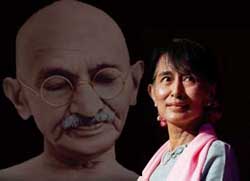Gandhi Journal Article-III ( JULY 2017 )
Relevance of Gandhi in modern times
By Rajen Baura
Looking at the present state of affairs in India, the birthplace of Gandhi, one would probably surmise that Gandhism, whatever the term may mean, cannot have any relevance in this twenty-first century. Gandhi is rightly called the Father of the Nation because he single handedly stood up against the mighty British Empire, without any arms, and brought her independence. However, today, Gandhi is mostly forgotten and his relevance questioned even by his ardent devotees. Today Gandhi is remembered in India mostly on his birthday which is celebrated as a national holiday rather as a ritual.
As a matter of fact, India is not following any of Gandhi's teachings which are mostly confined to text books. In fact, since independence, the country has witnessed many violent communal riots in this multi communal country. Gandhi's message of ‘swabalambi’, self-sufficiency with home spun ‘khadi’ cloth is not used now a days even as a social slogan. Statistics show that the country is definitely not following ‘sarvodaya’, a broad Gandhian term meaning 'universal upliftment' or ‘progress of all’ reaching the masses and the downtrodden. On the contrary, India today has the unique distinction of being the only country in the world which has the richest man in the world while at the same time more than 30 per cent of its population lives in dire poverty.
The above shows that today, Gandhism is a very confused ‘ism’ in India. Today many politicians in India use the term merely as a slogan and the common man make Gandhi almost out of reach of the younger groups by making Gandhi an unwilling ‘avatara’. That may be one reason why the only photo we see of Gandhi in India is always that of an old man which brings the image of a very simple and pious man who was meek and mild like Jesus Christ. While Gandhi was not a simple man to say the least, the above does not gives the right image of Gandhi and does not bring any inspiration to the younger group, the group most relevant for Gandhi.
As a matter of fact, India is not following any of Gandhi's teachings which are mostly confined to text books. In fact, since independence, the country has witnessed many violent communal riots in this multi communal country. Gandhi's message of ‘swabalambi’, self-sufficiency with home spun ‘khadi’ cloth is not used now a days even as a social slogan. Statistics show that the country is definitely not following ‘sarvodaya’, a broad Gandhian term meaning 'universal upliftment' or ‘progress of all’ reaching the masses and the downtrodden. On the contrary, India today has the unique distinction of being the only country in the world which has the richest man in the world while at the same time more than 30 per cent of its population lives in dire poverty.
The above shows that today, Gandhism is a very confused ‘ism’ in India. Today many politicians in India use the term merely as a slogan and the common man make Gandhi almost out of reach of the younger groups by making Gandhi an unwilling ‘avatara’. That may be one reason why the only photo we see of Gandhi in India is always that of an old man which brings the image of a very simple and pious man who was meek and mild like Jesus Christ. While Gandhi was not a simple man to say the least, the above does not gives the right image of Gandhi and does not bring any inspiration to the younger group, the group most relevant for Gandhi.

